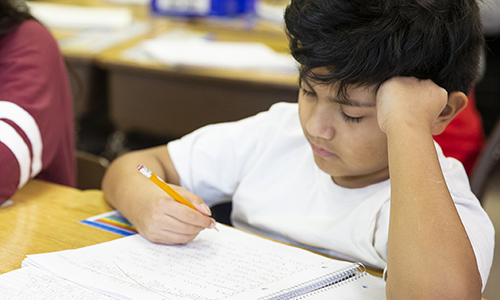School & test engagement
Educators need accurate assessment data to help students learn. But when students rapid-guess or otherwise disengage on tests the validity of scores can be affected. Our research examines the causes of test disengagement, how it relates to students’ overall academic engagement, and its impacts on individual test scores. We look at its effects on aggregated metrics used for school and teacher evaluations, achievement gap studies, and more. This research also explores better ways to measure and improve engagement and to help ensure that test scores more accurately reflect what students know and can do.


The impact of test-taking disengagement on item content representation
Rapid-guessing can distort test scores and adversely affect measurement. New research shows how disengaged responses can also distort content representation.
By: Steven Wise
Topics: Measurement & scaling, Innovations in reporting & assessment, School & test engagement


Validation and applications of rapid guessing to detect test taker disengagement
The International Association for the Evaluation of Educational Achievement (IEA) together with the Leibniz Institute for Research and Information in Education (DIPF) and the Centre for International Student Assessment (ZIB) offer an invitation to a three-day workshop on analyzing log file and process data from international large-scale assessments in education. The event will take place as an interactive webinar and online video conference on June 17th – 19th 2020.
By: Steven Wise
Topics: School & test engagement


The impact of test-taking disengagement on item content representation
Rapid-guessing can distort test scores and adversely affect measurement. New research shows how disengaged responses can also distort content representation.
By: Steven Wise
Topics: Measurement & scaling, Innovations in reporting & assessment, School & test engagement


What happens when test takers disengage?
Learn about recent research findings on test taking engagement and what it means for educators.
Topics: Innovations in reporting & assessment, School & test engagement


Steven Wise shares some of his most recent findings on test engagement in this interview.
The 74
Mentions: Steven Wise
Topics: Equity, School & test engagement


Ability to identify rapid guessing stands to improve interventions
Research at NWEA provides insight into rapid-guessing and what it means for students and educators.
Education Dive
Mentions: Steven Wise
Topics: Equity, Innovations in reporting & assessment, School & test engagement


This study investigates whether rapid guessing is a stable trait-like behavior or if rapid guessing is determined mostly by situational variables, and whether rapid guessing over the course of several tests is associated with certain psychological and background measures. We find that rapid guessing tends to be more state-like compared to academic achievement scores, which are fairly stable and that repeated rapid guessing is strongly associated with students’ academic self-efficacy and self-management scores.
By: James Soland, Megan Kuhfeld
Topics: Measurement & scaling, School & test engagement, Social-emotional learning


